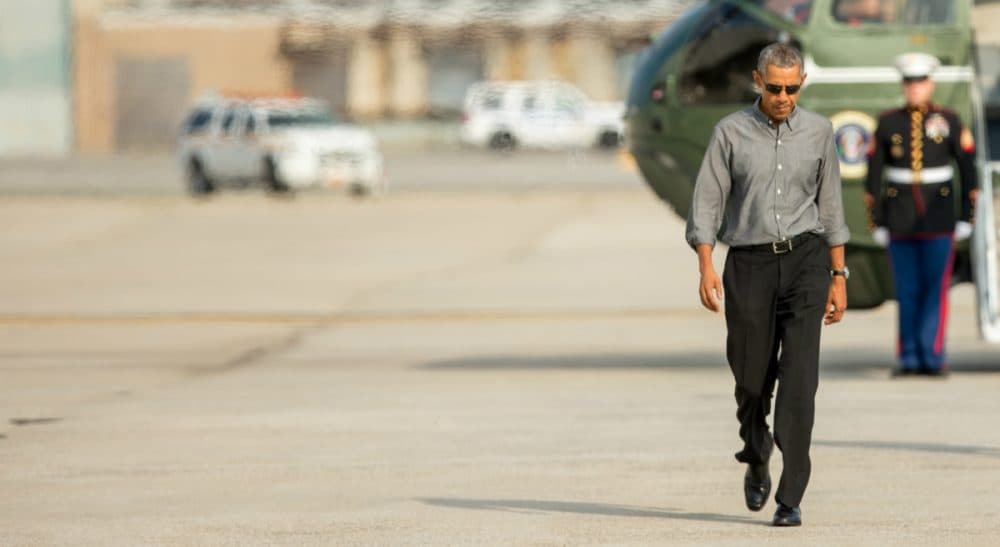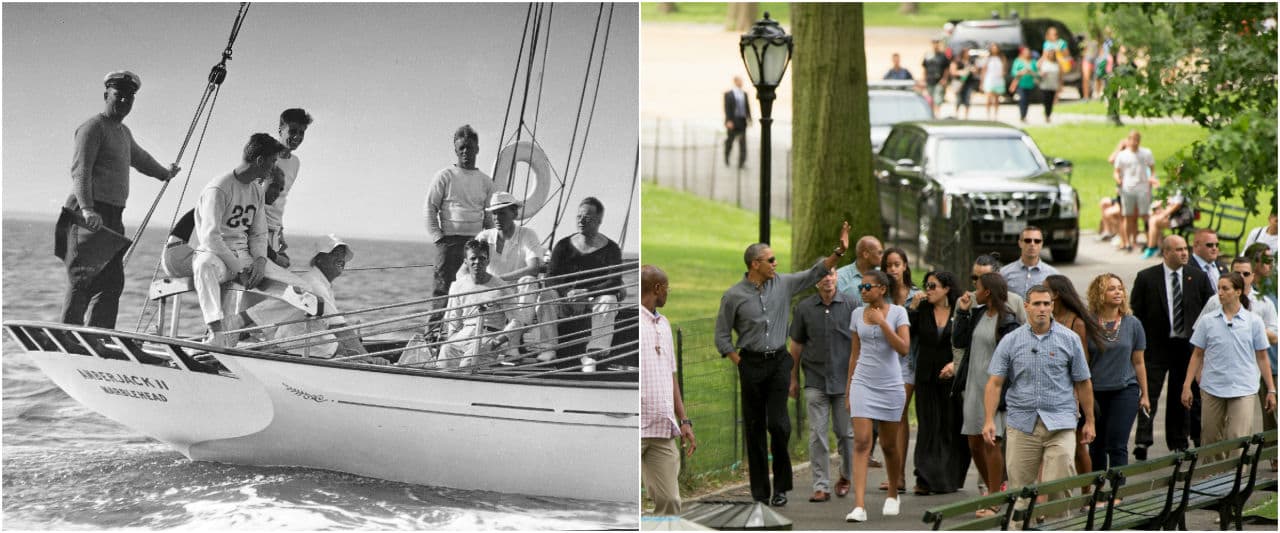Advertisement
The Price Of Presidential Isolation

One June day in 1933, President Franklin Delano Roosevelt’s yacht, The Amberjack II, sailed into Pulpit Harbor in North Haven, Maine and anchored there. The yacht was accompanied by one “watchful guard boat,” the USS Cuyahoga. Pretty soon an island fisherman rowed out to give the president some lobsters. A bit later, three young men summering on the island picked two baskets of strawberries and set out to deliver them. They were stopped and briefly checked by the guard boat, and then allowed to make their way. The president’s son, James Roosevelt, spoke with them, and invited them aboard to meet his dad, who greeted them with good cheer, chatted and thanked them personally for the berries.
There are many ways to measure how radically the world has changed in a short time, but this story struck me hard when I thought about the security involved recently when President Obama managed to take his daughters and several of their friends for a New York weekend. They ate at an Italian restaurant in Greenwich Village, visited the Whitney Museum after hours, walked in Central Park, and saw the musical "Hamilton" on Broadway. I cannot even begin to imagine what the security cost, but the photos available online suggest that their safety was made possible by a cast of thousands who worked to keep crowds of New Yorkers safely away ... I expect it had a price tag of millions.
the different sacrifices and challenges experienced by citizens of different stations is a critical lesson for leaders to keep constantly before them...
I am more than happy to have my tax dollars spent on their weekend, and I consider the president brave to take the father-daughter outing in the face of all the threats made on his life. But I’m agog at the difference 80 years has made in the ratcheting up of danger, of security demands, their costs and of the terrible isolation that results. Yes, the Obama trip was to a huge crowded city, while the Roosevelt outing was rural. But that’s the least of it. No contemporary president would ever be “allowed” to putter along the Maine coast anchoring here and there. Can you imagine the difficulties trying to protect him: the no-fly zone, the fleet of battleships, the Navy and Coast Guard personnel either diverted or put on constant high alert, the anti-missile defense system in play?
The more I think about the juxtaposition, the more I feel that our current arrangement is completely understandable; and yet the loss of personal freedom entailed in being president, and the loss of citizen’s access to him, is not only daunting, it’s harmful for the whole society. How can you feel a part of the everyday world if highways close for you to pass?
Monarchs in the past famously got into trouble when they got out of touch. Conversely, a great leader is one who manages to find ways to listen particularly to those among his subjects who have little access or power. Shakespeare recognized this in "Henry V" when he wrote the scene set the night before the Battle of Agincourt. The king disguises himself so he can slip into camp and speak unrecognized with his common soldiers. They give him an earful about their huge risk in battle versus their king’s much smaller one.

In other words, the different sacrifices and challenges experienced by citizens of different stations is a critical lesson for leaders to keep constantly before them; and one only learned by listening to people who are neither rich nor famous.
The bubble of surreal isolation we now create for presidents seems not only like the natural extension of our bizarre, scripted, pollster-controlled campaigns run (mostly) by super wealthy candidates who must listen hardest to their big donors and their core supporters, but like a phenomenon that extracts a huge cost in a leader’s capacity to share enough in the everyday concerns of constituents to stay in touch. (I’d like to see Donald Trump spend a week with Mexican immigrants and then make his obscene, racist comments again.)
I am not certain how in our crowded, mad world we can create less bubble and more 'real' moments. But we mustn’t lose sight of how important it is to support candidates who will keep trying...
Years ago, I remember reading about how hard Roosevelt, who had a wealthy elite childhood, worked to connect to his electorate and their concerns. After he had polio, he encouraged his wife Eleanor to act as his legs, eyes and ears, to visit orphanages and other such institutions, and report back on all she saw. My impression is the Obamas both work hard at breaking out of their ice palace, and certainly, the president’s singing of "Amazing Grace" at Clementa Pinckney’s funeral felt like a deeply grounded moment of union with other people’s grief. So too, his visit to El Reno prison in Oklahoma was groundbreaking and significant. On the other hand, I found him far too quick to silence a Latina trans activist, Jennicet Eva Gutiérrez, who earlier this year got herself escorted from a White House event, while shouting and trying to alert him to trans abuse in immigrant detention camps.
I am not certain how in our crowded, mad world we can create less bubble and more “real” moments. But we mustn’t lose sight of how important it is to support candidates who will keep trying to find ways to defy their isolation; who will listen to anyone who rows out to have a talk, even when it isn’t all about lobsters or strawberries.
